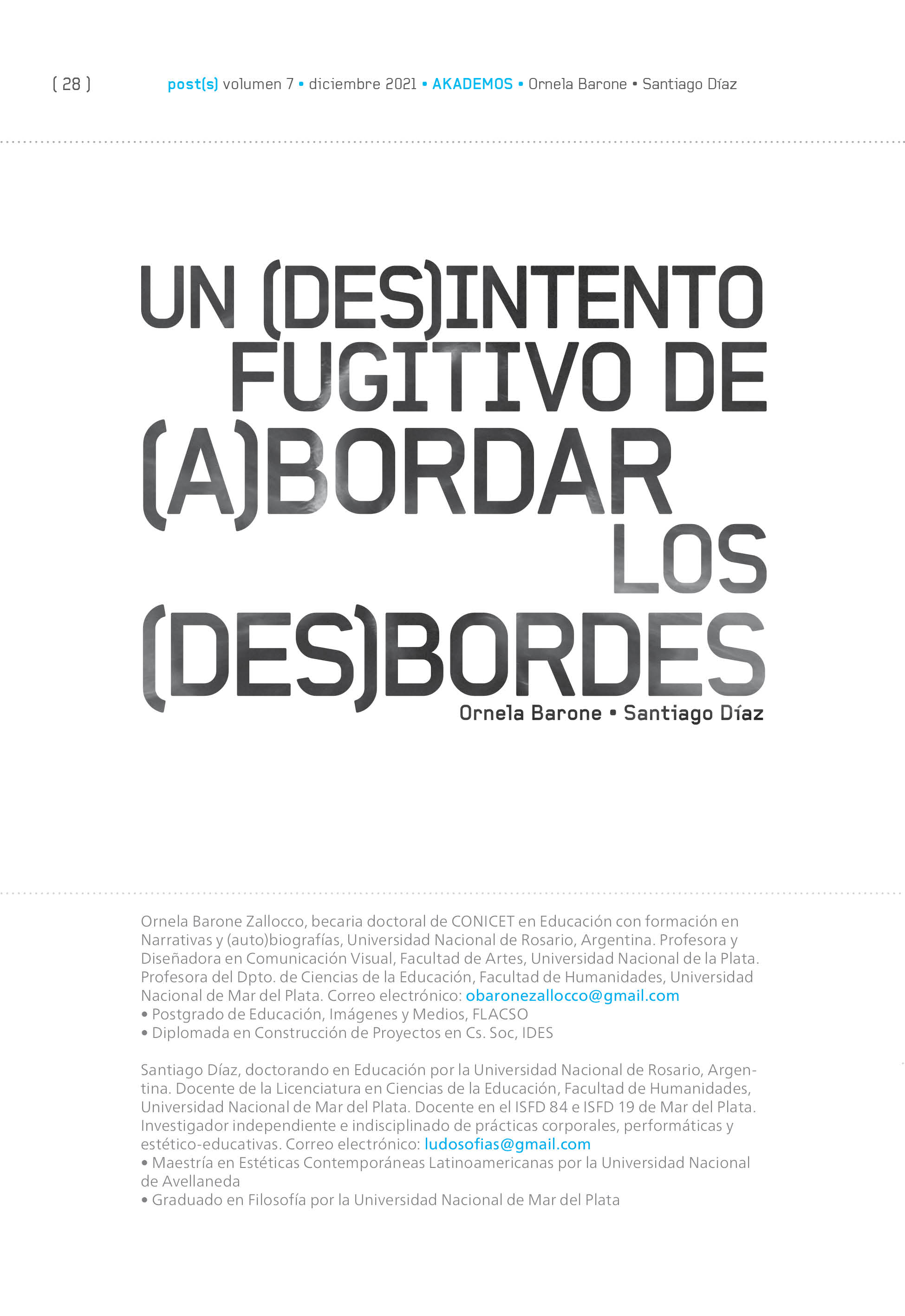Akademos
A fugitive attempt to approach/embroider the overflow/border

Published 2021-12-13
Keywords
- epistemology,
- ontology,
- experience,
- bodies,
- educational research
How to Cite
Barone Zallocco, O., & Díaz , S. . (2021). A fugitive attempt to approach/embroider the overflow/border. post(s), 7(1), 28–51. https://doi.org/10.18272/post(s).v7i7.2415
Abstract
In the present work the ways of thinking and producing knowledge have been decomposed, all the experiences that converse when we define overflowing onto-epistemic positions are made visible. Through a mixed writing of concepts, theories, references, experiences, sensibilities, we inquire about the overflowing ways that bodies affect the multiple sensibilities of territories, extractivist and capitalist (con) texts, educational institutions and the consecrated academy. Multiple questions are proposed as an attempt to dehisce this writing and its becoming (perhaps) possible insurgent agencies.
Downloads
References
- Anzaldúa, G. (2016). Borderlands/La fronteras. La nueva mestiza. Capitán Swing.
- Britzman, D. (2018). ¿Existe una pedagogía cuir? O, no leas tan hétero en Pedagogías Transgresoras II. Bocavulvaria.
- Cabnal, L. (2018). Tzk"™at, red de sanadoras ancestrales del Feminismo Comunitario desde Iximulew-Guatemala. Ecología Política. Cuadernos de debate internacional 54, 100-104.
- Coccia. R. (2017). La vida de las plantas. Una metafísica de la mixtura. Miño y Dávila.
- Cangi, A. (2020). Margen de deseo. Lo que vemos, lo que nos mira. En El cuerpo queer. Subvertir la héternormatividad. Letra Viva/ Ed. Lecol, 61-96.
- Deleuze, G. (2009). Diferencia y repetición. Amorrortu.
- Deleuze, G., y Guattari, F. (2009). ¿Qué es la filosofía? Anagrama.
- Deleuze, G., y Guattari, F. (2010). Mil mesetas. Capitalismo y esquizofrenia. Pre-Textos.
- Deligny, F. (2015) Lo arácnido y otros textos. Cactus.
- Díaz, S. (2012). Heterogénesis Autopoiética. Cuerpo y subjetividad en Félix
- Guattari. En Assalone, E., y Bedin, P. (Comps.), Bios y Sociedad I. Actas de las I Jornadas Interdisciplinarias de Ética y Biopolítica. Universidad Nacional de Mar del Plata, 231-239.
- Dieguez, I. (2007). Escenarios liminales. Teatralidades, performances y política. Atuel.
- flores, v. (2013). Interruqciones. Ensayos de poética activista. Escritura, política, pedagogía. Editora La Mondonga Dark.
- flores, v. (2019). Una lengua cosida de relámpagos. Hekht.
- Foucault, M. (2010). Defender la sociedad. FCE.
- Foucault, M. (2011). Historia de la sexualidad. La voluntad del saber. Siglo XXI
- Guattari, F. (2004) Plan sobre el planeta. Capitalismo mundial integrado y revoluciones moleculares. Madrid, Traficantes de sueños.
- Haraway, D. (2019). Seguir con el problema. Generar parentesco en el Chthuluceno. Consonni.
- hooks, b. (1994). Teaching to Transgress. Education as the Practice of Freedom. Routledge.
- Jandette, J. (2014). Qué carajos es poner el cuerpo. Performance. https://www.youtube.com/watch?v=JabMdko3xRc
- Nancy, J-L. (2008). Las Musas. Bs. As., Amorrortu
- Palermo, Z., y Quintero, P. (Comps.) (2014). Aníbal Quijano. Textos de fundación. Del Signo.
- Sadin, E. (2017). La humanidad aumentada. La administración digital del mundo. Caja Negra.
- Rubin, G. (2019). La teoría como justicia erótica. Bocavulvaria.
- Rolnik, S. (2019). Esferas de la insurgencia. Apuntes para descolonizar el inconsciente. Tinta Limón.
- Testa, S. (2018). Cuerpxs en fuga. Las praxis de la insumisión. Espacio Hudson.
